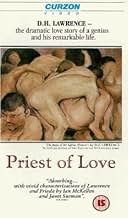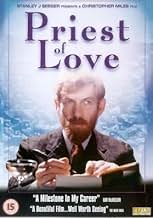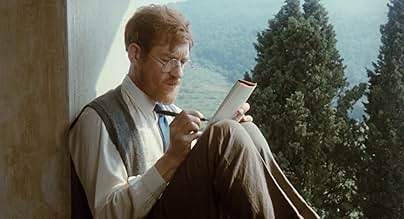Following the banning and burning of his novel, "The Rainbow", D.H. Lawrence and his wife, Frieda, move to the United States, and then to Mexico. When Lawrence contracts tuberculosis, they r... Read allFollowing the banning and burning of his novel, "The Rainbow", D.H. Lawrence and his wife, Frieda, move to the United States, and then to Mexico. When Lawrence contracts tuberculosis, they return to England for a short time, then to Italy, where Lawrence wrote "Lady Chatterley's ... Read allFollowing the banning and burning of his novel, "The Rainbow", D.H. Lawrence and his wife, Frieda, move to the United States, and then to Mexico. When Lawrence contracts tuberculosis, they return to England for a short time, then to Italy, where Lawrence wrote "Lady Chatterley's Lover".
- Director
- Writers
- Stars
- Dr. Uhfelder
- (as Mike Morris)
- Director
- Writers
- All cast & crew
- Production, box office & more at IMDbPro
Featured reviews
The film is just a bog standard biopic done from the write by numbers playbook. It hardly ever come close to the real D H Lawrence. The facts and events are there, all the wandering around the world etc, but you only have to read Lawrence's collected letters to know that the picture given here is rather superficial It isn't helped by some amateur dramatics style acting, particularly from a way below par Ian McKellen and Janet Suzman. A pet hate of mine is the lazy generic Northern accent adopted by most actors doing D H Lawrence. Ian McKellen made him sound as though he was brought up in Yorkshire rather than Notts. Admittedly the Nottingham/Derbyshire accent is hard to do. Robert Lindsey does it well, but then he comes from Ilkeston.
The other thing missing in this film is a sense of D H Lawrence's wit and humour, which can be seen very well in his letters, short stories and some of his poems. I also didn't like the way the script writer (Alan Plater in his soap writing mood) somewhat lazily bought into the feminist critique of the 1980s. D H Lawrence, who wrote very sensitively on women's issues, is made to seem as though he was a male chauvinist. Again, a more careful reading of his works would have shown this to be untrue.
So, overall, a pleasant enough journey round the world with some nice scenery and some good support actors. As another reviewer has pointed out, a bit like a dramatisation of an encyclopedia entry.
"Priest of Love" is a rather superficial and dull biography. While D. H. Lawrence's work was very controversial in its day and resulted in some well publicized book burnings and his personal life was weird (to say the least), this film never piqued my interest. Perhaps it was the flat performances by the leads or the script. Perhaps it was because Lawrence wasn't a man whose life I would want to emulate. However, I think the main problem is that the life of Lawrence would best be summed up in a mini-series and condensing about twenty years of his life into a film is a tall order. So, because so much time passes, it comes off more like a Cliff Notes version of his exploits. My recommendation is that you instead read up on Lawrence and his life...you'll learn more and it won't be so dreadfully lifeless as this movie.
Picture opens in 1924 with Lawrence (Ian McKellen), wife Frieda (Janet Suzman) and their friend Dorothy Brett (Penelope Keith) en route to Taos, New Mexico, for a self-imposed exile at the house of art patroness Mabel Doge Luhan (Ava Gardner). Back in Britain his books have been banned by the censor, Herbert Muskett (an effectively stern cameo by John Gielgud).
In a typical scene, Lawrence becomes irrational at a party and out of control, slaps Frieda around violently and breaks all the dishes, causing a speedy departure from Taos. Also characteristic is couple's unsympathetic decision to send Dorothy away. Amongst flashbacks detailing economically Lawrence's youth in Cornwall, Miles emphasizes the duo's sojourn in Italy at a villa in Florence provided by a new patron, Angelo Ravagli (Maurizio Merli). Lawrence writes "Lady Chatterley's Lover" there, with impressive care for detail in footage shot at the same Italian printing press where the book was first printed.
Key scenes involve the fearless duo pushing relentlessly for the truth in a sexual manifesto in literature (establishing Frieda as D. H.'s literary collaborator) and tasteful scenes indicating his bisexuality (with a youth nude bathing at an Italian seashore), plus relentless selfishness in inviting Dorothy to bed and then spurning her suddenly.
Dominated by pastoral landscape photography, pic lacks a dramatic edge, with D. H.'s battle from afar with the censor and his impending death by tuberculosis carrying little impact. Coda has Rapagli replacing the deceased Lawrence in Frieda's life and a happy ending for the life-loving survivors, whose joyous celebrations comically extend to absent-mindedly leaving Lawrence's coffin behind at the train station.
Director Miles and actor McKellen create a Lawrence who engages one's intellectual sympathy and is an arresting multi-dimensional figure (even given to an hilarious Gielgud impersonation mocking the censor), but whose selfishness and physical manhandling of Frieda clearly cut off a viewer's emotional support for the character. Too infrequently seen in films, McKellen gives a bravura performance, all the more remarkable for its avoidance of easy empathy. Veteran of a one-woman show on stage as Frieda, Janet Suzman is given her head by Miles and turns in a flamboyant, explosive turn which prevents the film from being dominated by McKellen.
Supporting cast is well-chosen with Ava Gardner looking great and utterly convincing in her best role in years as duo's free-spirited American connection. British comedienne Penelope Keith is the spitting image of her real-life counterpart, but Miles has not curbed her natural comic bent in what should be a straight role. Amongst minor players, Mexican matinee idol Jorge Rivero is well-used as Gardner's sexy young husband, while Italian singer/heartthrob Massimo Ranieri is similarly appropriate as a virile young stud.
Working with stunning locations, Miles and lighting cameraman Ted Moore produce a series of spectacular deep-focus compositions, and wisely present the flashback material in sharp, luminous visuals rather than the cliche of soft-focus. Although Miles adopts a stately pace, he and editor Paul Davies use quick cutaways at the emotional highpoints of scenes, a device which acts to distance the audience from the characters. Joseph James' romantic musical score is good.
Christopher Miles did a wonderful adaptation of "The Virgin and the Gypsy" 10 years before he made this film. He certainly is a scholar of Lawrence and a talented filmmaker, so why was this film so charmless and seem so shallow.
I will give a couple of reasons: First, I saw the 99 minute recut of the film. I imagine/hope that the apparently lost original 125 minutes was less choppy and jumpy.
Second, Ian McKellan was a terrible choice for the lead. He simply was too much of a stage actor at this point of his career and he plays most scenes for the the benefit of the baloney.
Third, the beginning shows Lawrence having a nude swim with a homosexual lover. The rest of the movie is about his love affair with his German wife. It is just confusing and undercuts the rest of the movie as we expect him to run off and leave his wife for a man at some point.
Fourth, the movie portrays Lawrence as a one dimensional lone victim of censorship, surely there were other writers being censored at the time and many powerful people supporting his rights to freedom of speech. Making the censor a buffoon (played dully by John Gielgud) doesn't help, but seems to trivialize the issue.
Fifth, Miles may have been to close to the material. He wants to give us a lot of factual information about Lawrence, but the history lesson feels like a history lesson, and there is little dramatic tension. Janet Suzman as Frieda Lawrence seems to carry the weight of whatever dramatic tension there is.
The movie does have nice cinematography. However all the movies adapted from Lawrence's work also have great cinematography and much better characters and stories.
Did you know
- TriviaThis movie was released on the 51st Anniversary year of the death of author D.H. Lawrence.
- Quotes
Herbert G. Muskett: [looking at a copy of Lawrence's book "Kangaroo"] It does not appear to be obscene in absolutely legal terms. Anti-British to the point of insanity.
Clerk to Herbert G. Muskett: Apparently, Mr. Lawrence is going to America.
Herbert G. Muskett: We must inform the authorities.
Clerk to Herbert G. Muskett: It's been attended to, Mr Muskett.
[reaching for the book]
Clerk to Herbert G. Muskett: Shall I take this?
Herbert G. Muskett: Leave it. I shall read it again. To make absolutely sure
[recommences intense study of the book]
- Alternate versionsAn abridged 99 minute "Centenary version" was released in 1985 in the UK to better box office and critical acclaim to commemorate the birth of D.H.Lawrence. As well as inevitable cutting of some material the shortened version also rearranges the placement of some of the flashback sequence and ends with Lawrence's death excluding the New Mexico epilogue. The short version is a properly re-prepared effort however with the appearance order end-credits redone to reflect the new positions in which characters first appear. Copies of the 1981 version, which was first released in the UK during the 1982 Falklands War when theatre going plummeted, now no longer exist.
- SoundtracksThe Way We Get It Together
music by Francis James Brown and Stanley Joseph Seeger (as Joseph James)
Lyrics by Christopher Cone
Played by The Pasadena Roof Orchestra
- How long is Priest of Love?Powered by Alexa






































